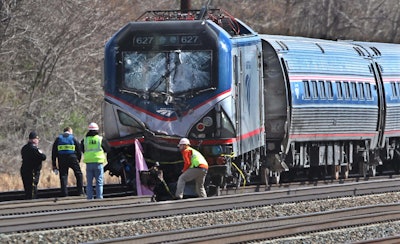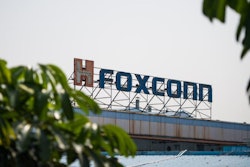
Amtrak's safety culture suffered major lapses, including more than two dozen unsafe conditions at a work zone where a train slammed into a maintenance backhoe last year, killing two workers, federal investigators said Tuesday.
Chief among them, investigators said, were a foreman's failure to make sure dispatchers were still rerouting trains from the area under repair near Philadelphia and the crew's failure to use a device that would have automatically blocked access to those tracks.
"Had any of these issues been addressed, the accident may have been prevented or the severity mitigated," National Transportation Safety Board investigator Joe Gordon said at a public meeting on the crash at the agency's Washington headquarters.
The April 2016 crash killed backhoe operator Joseph Carter Jr. and supervisor Peter Adamovich. About 40 passengers on the New York to Savannah, Georgia, train were injured.
NTSB chairman Robert Sumwalt said Amtrak's approach to safety — with evidence showing it prioritized on-time performance while threatening to fire workers who broke rules — had created a culture of fear where bending the rules was acceptable to "get the job done."
 In this April 3 2016, file photo, Amtrak investigators inspect the deadly train crash in Chester, Pa. The Amtrak train struck a piece of construction equipment just south of Philadelphia causing a derailment. The National Transportation Safety Board is set to review the findings of an investigation into what caused a speeding Amtrak train to slam into a backhoe last year near Philadelphia, killing two maintenance workers. The board is meeting Tuesday, Nov. 14, 2017, in Washington to determine a probable cause of the deadly crash. (Michael Bryant/The Philadelphia Inquirer via AP, File)
In this April 3 2016, file photo, Amtrak investigators inspect the deadly train crash in Chester, Pa. The Amtrak train struck a piece of construction equipment just south of Philadelphia causing a derailment. The National Transportation Safety Board is set to review the findings of an investigation into what caused a speeding Amtrak train to slam into a backhoe last year near Philadelphia, killing two maintenance workers. The board is meeting Tuesday, Nov. 14, 2017, in Washington to determine a probable cause of the deadly crash. (Michael Bryant/The Philadelphia Inquirer via AP, File)"Amtrak's lack of a strong safety culture is at the heart of this accident," investigator Mike Hoepf said.
Amtrak said it would respond to the NTSB's findings later on Tuesday.
Toxicology reports showed that Carter, 61, had cocaine in his system and Adamovich, 59, tested positive for morphine, codeine and oxycodone. The train's engineer, 47-year-old Alexander Hunter, tested positive for marijuana, according to the reports.
Only Hunter, as a train crew member, would have been subject to random drug testing at the time of the crash. In June, federal regulators expanded the testing program to include track maintenance workers. On Monday, the Federal Railroad Administration issued a rule mandating testing for opioids beginning Jan. 1.
Hunter is no longer employed by Amtrak. No amount of marijuana use by an engineer is acceptable, the railroad has said.
He told investigators that he knew of maintenance work being done in the area but was not given any warnings about equipment being on the same track as his train.
Hunter blew the train's horn and hit the brakes once he saw equipment on an adjacent track and then on his own track. Investigators say that was about 12 seconds before impact.
The train slowed from 106 mph to 100 mph at impact and only came to a complete stop about a mile down the track. The lead engine of the train derailed.






















